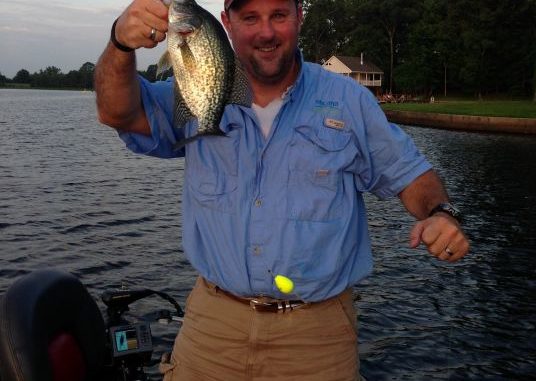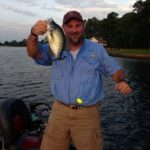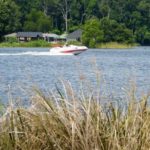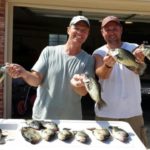
Sure, you could stay home and soak up the air conditioning this month. But this angler knows Black Bayou Reservoir near Benton is full of big black crappie.
It was going to be a typical late-summer day — muggy with a high in the upper 90s. Normally, I would have stayed inside under the air conditioning, but on this particular morning I was off to Black Bayou Reservoir near Benton.
Despite the heat, Mark Weldon had been catching some good crappie, and he invited me to join him and his friend Dale Watts, who had driven down from Oklahoma.
Pulling into the deserted public ramp before daylight, I had just enough time to launch my boat before Weldon and Watts arrived. Having never fished the lake, I followed them in the growing light and admired the scenery.
Black Bayou is rather long and narrow with several inlets, and it is surrounded by impressive houses with beautifully landscaped yards. The lake is quite pretty and very convenient for fishermen in the Shreveport-Bossier area.
Weldon slowed down a few hundred yards from the dam and eased toward the left bank to begin fishing.
“The water here drops off from 16 feet to about 18 feet, and the crappie seem to stay along this edge,” he said as he lowered his trolling motor.
With the boat positioned over the drop-off, Weldon pulled out four poles rigged with slip corks and shiners, and fitted two on either side of the boat.
“Sometimes they seem to bite more on the shallow side and sometimes more on the deep side,” he explained. “You just have to see where they are each day.”
As he tried to locate the fish, Weldon explained why he fishes Black Bayou so regularly.
“It’s very convenient for me because I only live about 10 minutes away, and my mother-in-law has a house on the lake just around the corner,” he said. “Sometimes I’ll fish from daylight to 10 (a.m.) or so, and then pick up my 4-year-old son at her house and let him fish for a few minutes and play with the shiners.
“That way I can get my serious fishing in and also spend time with my boy and introduce him to fishing without wearing him out or losing his patience.”
While preparing my own poles, I asked Weldon how deep I should fish.
“In the summer there will be some fish on the bottom and some suspended about 9 or 10 feet deep. That’s the ones we catch,” he said. “I think the suspended fish are feeding, while those on the bottom are not.
“I’ve found that if you start catching catfish, you’re fishing a little too deep for crappie.”
The sun had yet to peak over the horizon, which, according to Weldon, was perfect timing.
“The late-summer pattern is that the crappie will start biting about 30 minutes after daylight,” Weldon said. “I usually don’t stay longer than 10 or 10:30 because of the heat, but sometimes I leave them biting.”
As if on cue, Watts caught a small bar fish, and then Weldon landed a nice black crappie.
“He took that down slow and steady. That’s usually how they do it here,” Weldon said.
Almost immediately, another cork slid under the water and Watts landed a second crappie.
One of the advantages of fishing Black Bayou in the late summer is that the weather tends to be stable. Unlike winter fishing, when you have to time your outings around cold fronts and windy days, nearly every day is fishable during the summer.
“I don’t really look at the weather forecast,” Weldon admitted. “I just come out here whenever I have the time.
“The only thing I do consider is the wind. If it’s blowing in the wrong direction it can get too choppy to fish comfortably.”
For the next couple of hours, we moved back and forth along the drop-off. While the bite was not fast and furious, it was steady.
Weldon and Watts fished four poles each, and landed about a dozen nice crappie, one good catfish and several bar fish. They missed several fish because some of the bites were rather subtle, and quite a few fish came off at the boat.
I held two poles because feeling the “thump” of a bite is my favorite part of fishing. One was rigged with a shiner and the other with a Black Lake gray-and-chartreuse hair jig.
I didn’t do as well as my companions, but I did manage to land some nice fish and missed quite a few bites.
Later in the morning, Weldon pointed toward the dam and explained that it was another good summertime place to fish.
“When it starts getting really hot about June, the crappie will concentrate along the dam where there’s a series of steps under the water,” he explained. “A lot of baitfish collect on those steps, and the crappie will be there feeding. You just have to look for them because one day they might be on a step 6 feet deep, and the next day they might be on a 10-foot step.”
While we were fishing, I noticed that a lone boat stayed in one spot out in the middle of the lake. Weldon explained that there is some hidden structure in Black Bayou.
“He’s always fishing that same spot,” he said. “There must be some brush or something there.
“A lot of people sink brush tops, and they can be good if you know where they are. I’ve sunk a bunch of them and have caught a lot of fish off them, but it’s a lot of work.”
By midmorning, the sun was becoming brutal, and we were ready to get out of the heat. We had not filled the ice chest, but we did catch a respectable number of crappie. When I commented on their healthy size, Weldon that’s one of the benefits of the lake.
“Overall, I don’t catch as many here as I do in Cypress Bayou, but these crappie will be- to 1 1/2-pound fish,” he said. “The biggest one I’ve seen come out of here was caught by my daughter Gracie a few winters ago. She hung something and couldn’t land it. I didn’t think it was a crappie until she got it to the top of the water. She eventually pulled the crappie out, and it weighed a little more than 3 pounds.”
Weldon added that they had been catching good fish for the last several weeks.
“Just a few Sundays ago, me and my daughter Maggie came out here to this same spot. We caught 57 and were back home by 9:30,” he said.
Dog days or not, fishing like that can make anyone give up the air conditioner for a few hours.



